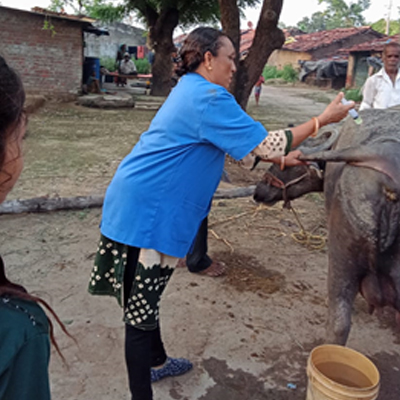LIVELIHOOD
Women from rural populations of India are subject to harsh patriarchal practices, barring them from seeking employment opportunities and attaining financial freedom. The life of Rizvana Ben had been no different for a long time. Belonging to the Dabha village from Gujarat, Rizvana is from an orthodox Muslim household. She resides with her husband and two sons. Up until 2018, she was disallowed to attend community meetings in the village or join Self Help Groups (SHG). Nonetheless, she persevered and eventually became an active member of the village’s Parivar SHG.
Joining the SHG helped Rizvana receive training in areas such as leadership, communication, financial literacy, and management. Over the course of time, her husband transformed his views and grew supportive of his wife’s aspirations. That was when Rizvana expressed an interest in taking up the Pashu Sakhi training and certification by CARE India. Considering livestock is a cardinal element of the agricultural ecosystem, pursuing the Pashu Sakhi certification turned Rizvana’s life around. Until that point, she was suffering from health conditions that were affecting her quality of life. But a year into the training and subsequently working, she has completely stopped her medication and reports perfect health.
“I am now quite busy with work and am thoroughly enjoying it,” says Rizvana, when asked about how she was feeling health-wise. Fortunately enough, the latest health reports also revealed improvement and recovery. Since the completion of the Pashu Sakhi program, Rizvana has proudly displayed her certificate on their living room wall.
Not so long after completing the certification, Rizvana became a go-to resource for livestock care in her village. Rizvana is now fondly referred to as “Pashu Sakhi Ben.” Starting from primary care and treatment to vaccination and fodder nutrition for goats, Rizvana became a powerhouse of a resource for all her villagers raising livestock.

On top of shouldering the aforementioned responsibilities as a Pashu Sakhi, Rizvana is also developing a small-scale goat farm in her village. From being restricted to attending community meetings to becoming a beacon of women entrepreneurship, Rizvana has come a long way. The progress achieved by her is testament to how women’s education in India can lead to improved economic outcomes for marginalised women populations in the country. By making a positive difference in the lives of women such as Rizvana, CARE India is able to push the envelope in the realm of women empowerment in India.
About the Programme: The Self Help Group (SHG) program is a key initiative by CARE India to empower women in India. The program brings together women from the same community and provides training in entrepreneurship, financial literacy, and business skills. SHG members can access microfinance loans to start or expand their businesses, and the group’s savings are used to provide loans to members who need them. The SHG program promotes social empowerment by allowing women to support each other, share experiences, and advocate for their rights. It has helped thousands of women become financially self-sufficient and break the cycle of poverty.





